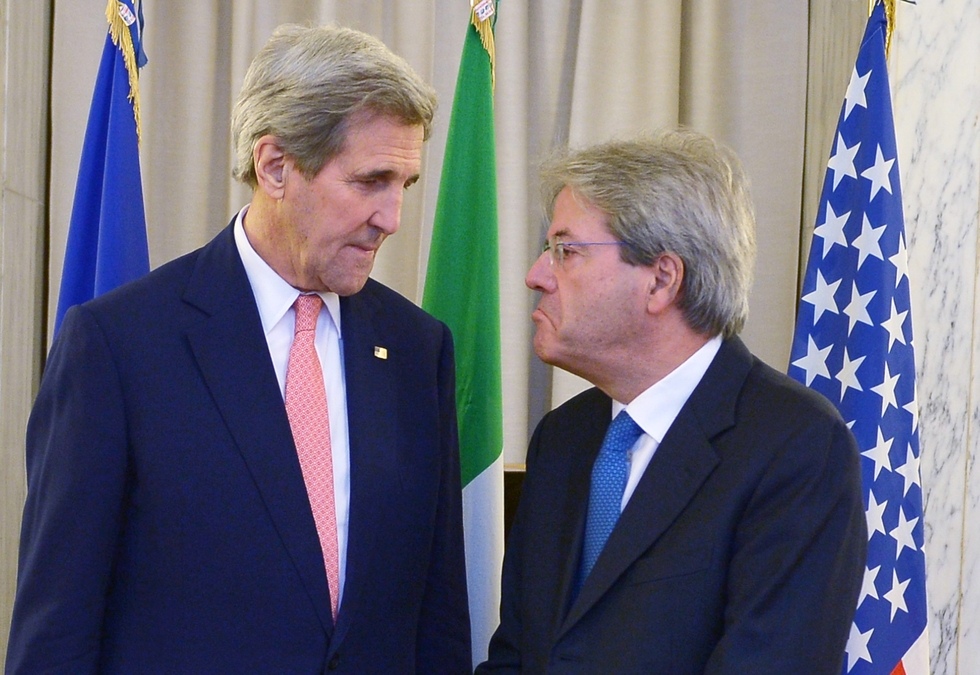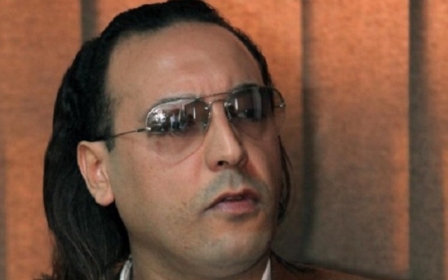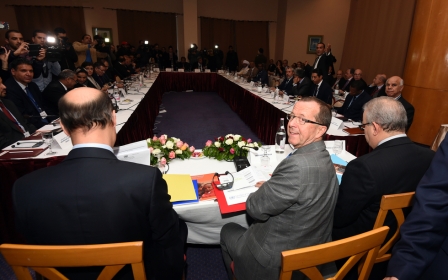Italy talks aim to strike Libya unity ahead of new fight against IS
World leaders have gathered in Rome to impress on Libyan leaders the need to unite warning of the threat posed by IS in North Africa

US Secretary of State John Kerry talks with Italy's Foreign Minister Paolo Gentiloni (AFP)
Published date: 13 December 2015 12:09 GMT
|
Last update: 8 years 11 months ago
Italy and the United States hosted talks on Sunday to press Libya's divided political factions to quickly sign up to a United Nations-backed peace agreement.
Western capitals fear that unless Libya forms a united government on Wednesday the Islamic State group will strengthen its grip on their new coastal territory.
And, without a recognised central authority and amid ongoing faction-fighting, Libya could once again become a major source of refugees and migrants headed for Europe.
Foreign Minister Paolo Gentiloni welcomed Secretary of State John Kerry, UN Libya envoy Martin Kobler and 18 European and Arab ministers to the foreign ministry in Rome.
After the international talks in the morning, the envoys were to meet with representatives of Libya's divided political factions to urge them to reunite their country.
"We have to demonstrate that the action of governments and diplomacy can be faster and more effective than the threat of terrorism which we face here," Gentiloni said last week.
"We cannot allow it to develop and we have to back our ability to stop it with a negotiated approach involving the Libyan parties," he said, at a regional security conference.
After Libyan political representatives had agreed to sign a version of the UN-mediated deal on Wednesday, he said, the Rome talks are supposed to show international solidarity.
A senior US official told reporters travelling with Kerry that the meeting would "provide framing and momentum for the signing ceremony" to take place in Morocco.
The United Nations deal has the benefit of unifying the negotiation process and has the support of the regional powers supporting rival factions in Libya's conflicts.
For these reasons, US and Italian officials believe it is time to end the division of Libya between two rival governments and a patchwork of warring factions.
But critics of the process warn that forcing Libyans into a foreign-mediated process could strengthen existing resistance to the pact and undermine future peace efforts.
Former Italian foreign minister Emma Bonino and the head of International Crisis Group Jean-Marie Guehenno called the rush towards a Wednesday signing "an irresponsible bet."
Writing in Politico, the pair said it is "wishful thinking" to believe a majority of Libyans will support a foreign-backed sole national authority.
Under current security conditions it is unlikely, they argue, that such a government could even enter Tripoli safely.
"This means they will have no control over state administration, including the pivotal central bank," they wrote.
"It could trigger renewed fighting for control of the capital."
And any attempt, whether failed or successful, to restore authority to Tripoli could feed separatist rumblings in eastern Libya, they warn.
Analysts who addressed Italy's Mediterranean Security Conference on Friday were also downbeat.
"The UN process is much weaker than many EU governments realise, but it is the only game in town," said Mattia Toaldo of the European Council on Foreign Relations.
On Friday, Salah el-Makhzoum, a vice president in the parliamentary body based in Tripoli, said it was a "happy day" when he announced the deal would be signed on 16 December.
And an official of the rival House of Representatives (HoR) parliament, Mohammed Choueib, said "we have decided to move beyond this difficult period and ask everyone to join us."
But neither man could promise their colleagues in Tripoli or Tobruk would ratify the deal, under which Libya would be governed by a nine-member presidential council.
And hundreds of protesters gathered in Tripoli's main square on Friday afternoon, waving Libyan flags and holding signs calling for a rejection of the UN deal.
Libya descended into chaos following the 2011 ousting and killing of long-time leader Muammar Gaddafi.
It has had rival administrations since August 2014, when the Misrata-led alliance of militias overran Tripoli, forcing the HoR government to take refuge in the east.
US and European sources say the aim is to form a unity government within 40 days of Wednesday's signature, after which UN sanctions could be imposed to force an accord.
If the deal sticks, it would enable Libya to better govern itself and to fight the Islamic State fighters that have seized territory around Gaddafi's hometown Sirte.
But it would also allow a UN-recognised administration to request arms shipments and even foreign military intervention to help rid itself of the insurgents.
Italian premier Matteo Renzi has said Rome would command a military mission should the UN agree, and there have been reports France and Britain are ready to take part.
New MEE newsletter: Jerusalem Dispatch
Sign up to get the latest insights and analysis on Israel-Palestine, alongside Turkey Unpacked and other MEE newsletters
Middle East Eye delivers independent and unrivalled coverage and analysis of the Middle East, North Africa and beyond. To learn more about republishing this content and the associated fees, please fill out this form. More about MEE can be found here.




